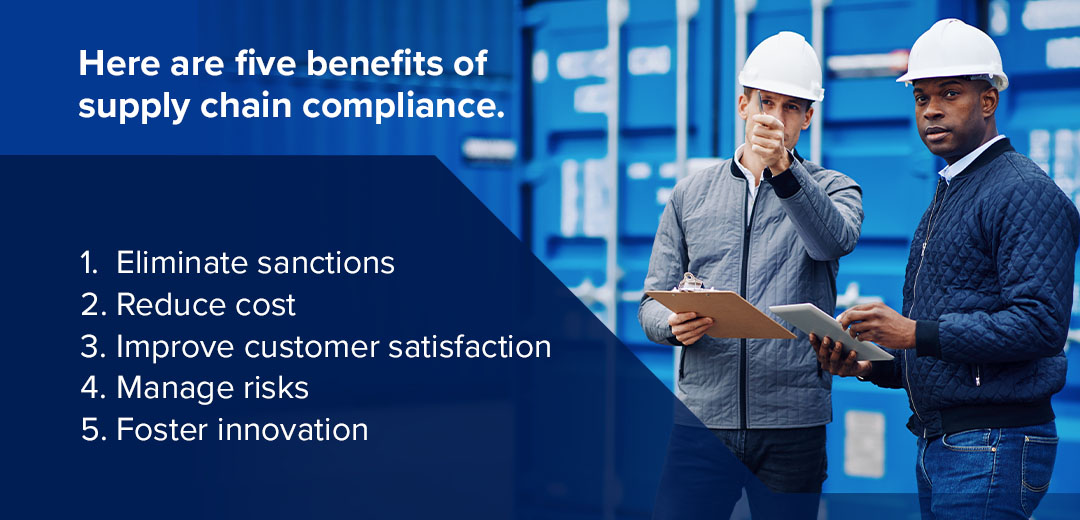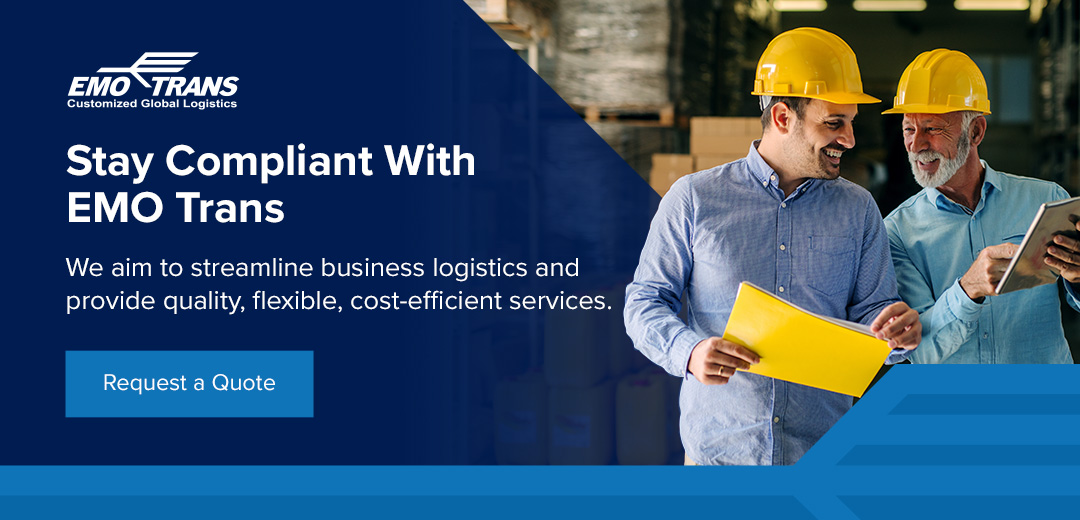
While supply chain compliance can be complex, it has many benefits. As a strategy, businesses worldwide establish legal departments or outsource compliance services to professionals with industry experience. Also, some organizations partner with knowledgeable logistics companies to handle their imports and exports.
This guide discusses supply chain compliance and provides tips for transporting products safely and cost-efficiently. Ultimately, you’ll learn how to ship your goods without worrying about regulatory breaches.
What Is Compliance in Supply Chain Management?
Compliance in supply chain management ensures supply chain suppliers, logistics companies, manufacturers and other industry players meet specific requirements. Government agencies and international organizations set these standards to keep supply chain processes safe and secure. While some only apply to particular jurisdictions, others are international and appropriate regardless of your location.
- Protecting workers and the environment
- Product security and safety
- Data protection
- Financial regulation
- Crime prevention
What Are Some Examples of Supply Chain Laws and Standards?
In the United States, many state and federal laws and international treaties cover supply chain processes. Here are some examples.
- Uyghur Forced Labor Prevention: The law bans importing goods partly or wholly made in China’s Xinjiang region. Customs and Border Protection can seize such materials and impose sanctions like fines unless the retailer demonstrates the supply chain was free of forced labor. Importers have a limited duration to rebut the presumption that forced laborers made the goods.
- The United States-Mexico-Canada Agreement: Like the UFLPA, the USMCA bans imported goods produced by forced or child labor. It also addresses sex-based discrimination in the workplace and protects migrant workers.
- Slave-Free Business Certification Act of 2022: The Senate introduced this law in 2022, requiring certain businesses to audit their supply chain for human trafficking and labor practice activities. Covered companies must submit and publish the audit report and make efforts to eliminate forced labor from the supply chain.
Suppliers and logistics companies may also need to comply with other standards and get various certifications or licenses.
- Good Distribution Practice: This standard is the minimum wholesale distributors must meet to maintain the quality and integrity of medicines throughout the supply chain. GDP requires distributors to use tracing systems to locate faulty products and recall them when necessary. The standards also apply to sourcing, handling, storing and transporting active pharmaceutical ingredients.
- Ocean Transportation Intermediary license: Organizations that operate as Non-Vessel Operating Common Carriers in the U.S. must obtain an OTI license from the Federal Maritime Commission. An NVOCC is a transport company that organizes shipments for clients independently under its house bill of lading without owning any vessel.
- International Organization for Standardization: ISO standards are internationally recognized formulas that describe the best way to perform specific activities. For example, ISO 9001:2015 establishes the minimum standards for quality management systems. Organizations must follow the requirements to consistently provide products and services that meet customer and regulatory demands.
The supply chain regulations and standards are numerous and may change depending on the location.
Why Is Supply Chain Compliance Important?
Here are five benefits of supply chain compliance.

- Eliminate sanctions: Complying with supply chain regulations helps you avoid penalties, fines and lawsuits. It also enables you to maintain a good reputation, which is excellent for attracting new clients.
- Reduce cost: Partnering with transport and logistics companies that comply with supply chain regulations can save you the money you’d otherwise spend on lawsuits. It also improves efficiency by reducing waste.
- Improve customer satisfaction: Consumers have become more conscious about the products they use. They want to know about environmental impact and corporate responsibility. Complying with supply chain regulations can help you meet those expectations.
- Manage risks: Risk management is a primary element of supply chain compliance. Adhering to the laws can help you reduce cyberattacks, fraud and sanctions.
- Foster innovation: Implementing industry best practices helps you identify process gaps. As you improve those processes, you create more efficient systems to drive innovation and creativity.
Common Supply Chain Compliance Challenges
Here are three standard supply chain challenges.
1. Complex Requirements
Complicated rules and regulations are the primary obstacles of supply chain compliance. Retailers and suppliers must follow many laws and standards. Some of these requirements differ from country to country, making things even more complicated for international businesses. Also, when the laws change, you must learn the new conditions and ensure everyone in the organization complies.
2. Untrained Staff
Supply chain compliance is primarily technical, yet you must ensure every company member is well-prepped. Workers may have expertise in other aspects of the supply chain, but it helps to provide continuous compliance training for everyone. Compliance requirements affect every part of your operations, so it’s wise to include those outside your legal team.
3. Unlicensed Shippers
Transport and logistics companies play a significant role in the supply chain. A retailer can check all the boxes, but the challenge continues if the shipper lacks the requisite qualifications or knowledge. As a pro tip, it’s best to do your due diligence and choose a licensed and professional transport company. You can verify from the company’s website or ask them whether they comply with the requirements.
Supply Chain Compliance Best Practices
Here are three best practices for supply chain compliance.
1. Establish Robust Governance Structures
Besides creating a dedicated legal team, it’s vital to establish strong internal structures and processes. The governance and leadership program must cover every team member and integrate the relevant ethical and compliance standards into your culture.
2. Conduct Risk Assessments
Conduct risk assessment and due diligence to identify potential threats and the legislation or standards that apply at each stage of the supply chain. Again, prioritize high-risk jurisdictions, industries and environments when establishing protocols.
3. Partner With Compliant Logistics Companies
Most businesses lack the resources to stay abreast of various jurisdictions’ shipping and trade laws. As a solution, they transact with logistics professionals who understand the industry’s demands.
Stay Compliant With EMO Trans
EMO Trans is a global logistics and transport company with decades of industry experience. We are knowledgeable in trade compliance and do the heavy lifting so you can focus on other aspects of your business. We have multiple certifications, accreditations and licenses, including ISO 9001:2015, OTI and GDP. We aim to streamline business logistics and provide quality, flexible, cost-efficient services.
Do you want to import and export goods safely? Request a quote now!

